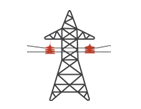2021 Federal Infrastructure Bill: What Does it Mean for Energy in Oregon?
On November 15, 2021, President Biden signed the $1.2 trillion Infrastructure Investment and Jobs Act into law. Oregon expects to receive funding for energy efficiency, weatherization, grid resilience, and more over the next five years.
Below are funding estimates* for a few of Oregon’s energy programs. The Oregon Department of Energy is committed to ensuring our state is well-positioned to leverage these dollars in support of a safe, equitable, clean, and sustainable energy future.
State Energy Program
$6.5 Million in funding to the Oregon Department of Energy to support investments in clean energy, energy efficiency, and resilience.
Energy Efficiency
$3.2 Million for capitalization of an energy efficiency Revolving Loan Fund and Energy Efficiency and Conservation Block Grant program at the Oregon Department of Energy, which will support energy efficiency investments in Oregon communities.
Weatherization
$34.7 Million for Oregon Housing and Community Services to support weatherization and energy conservation services for low-income households.
Electric Vehicles
$50 Million to the Oregon Department of Transportation to construct electric vehicle charging infrastructure.
Resilience & Reliability
$TBD. USDOE will allocate about $50 million to Oregon to make investments that enhance the resilience and reliability of the electric grid.
Energy Auditor Training
Up to $2 Million. USDOE will competitively offer $40 million to U.S. states to train energy auditors to help home business owners identify opportunities save energy and money by using less energy.
Additional Funding
The Act includes nearly $100 Billion in additional funding for infrastructure projects. Oregon communities may have an opportunity to receive additional energy-related funding from the Act for: energy efficiency and conservation, transmission lines, smart grid investments, zero emission school buses, projects to improve the energy resilience of ports, hydrogen commercialization and deployment, carbon capture and utilization, grants to public school facilities for energy efficiency and renewable energy improvements, building energy codes technical assistance and training, grants for charging infrastructure, battery recycling grants, smart manufacturing technology, and more.
*Note: funding amounts are estimates as of November 2021.






